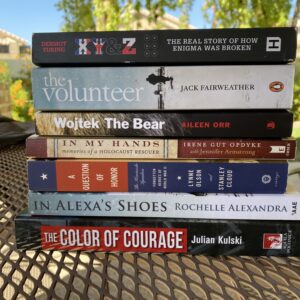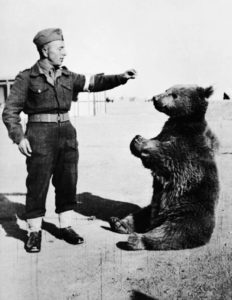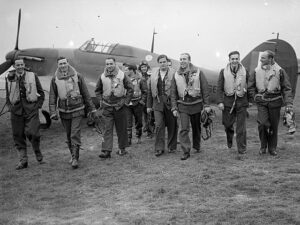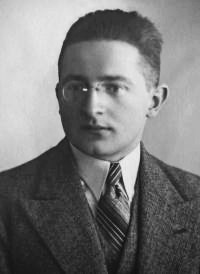 Here are seven books on Polish courage during World War II. I have read all of them (and many more) about the Polish experience during World War II. Each book included here either corrects history as told by others (and other countries) or enlightens the reader about different facets of the Polish experience. Most Poles will recognize these stories and people, but they deserve a broader audience beyond the Polish community.
Here are seven books on Polish courage during World War II. I have read all of them (and many more) about the Polish experience during World War II. Each book included here either corrects history as told by others (and other countries) or enlightens the reader about different facets of the Polish experience. Most Poles will recognize these stories and people, but they deserve a broader audience beyond the Polish community.
These books were published long after I began my research for my book more than twenty years ago. I am reassured that more attention and awareness are being paid to modern Polish history, especially as Poland, a US ally rises on the world stage.
October is Polish American Heritage Month, so here is my contribution. 🙂
“Without words, without writing and without books there would be no history, there could be no concept of humanity.” – Hermann Hesse
There are thousands of books written on the Holocaust. There are far fewer from the Polish point of view.
A World War II Museum in the US will focus on different historical content than a World War II Museum in the UK, or a World War II Museum in France. A Holocaust Museum will focus on a different history from the three previous war museums. Each institution has its focus and mission, and each tells a significant part of history. The same is true of memoirs. Authors can only tell their stories. None represents the full history of World War II, especially in Poland. Yet, like tiny pixels in an image, together they form a broader, more complete view of historical events.
For Poland, suffering under German occupation is only half the story. Germany invaded Poland on September 1, 1939. Russia invaded Poland on September 17, 1939. Both Germans and Russians brutalized and murdered millions of Poles, primarily civilians, among many other war crimes. Six million Poles lost their lives – three million Jewish, and three million Christian. The Holocaust in Poland is well documented (though with certain biases.) The war crimes and murder of Poles by both Germans and Russians and the heroism of the Polish resistance are far less told or commonly known. Generally, both are omitted from Holocaust education, unless referenced as “rescuers.”
“The most effective way to destroy people is to deny and obliterate their understanding of their history.” – George Orwell
Recommended books on Polish Courage during World War II
These books are but a subset of many good books out there. Each represents a different facet of the Polish experience as written from the Polish point of view.
The Color of Courage by Julian Kulski
Julian Kulski was ten years old when Germany invaded Poland. This is his diary of growing up during five brutal years of German occupation. He fought as a Scout in the 1944 Warsaw Uprising (not the 1943 Warsaw Ghetto Uprising) and ended the war as a German POW at age 16.
In Alexa’s Shoes by Rochelle Alexandra
This is the story of the author’s Polish grandmother, Alexa, who was forced to serve as slave labor in Germany. She was caught in a German roundup in her hometown of Lublin. Eventually sent to Germany, she was selected by an SS officer and his wife, in part for her blond, blue-eyed appearance. She worked on their farm every day from 4 a.m. long into the night for five years.
In My Hands, memories of a Holocaust Rescuer, by Irene Gut Opdyke
Irena Gut was born into a Catholic family, in Kozienice, Poland. While hiding during the invasion, Russian soldiers discovered her, then beat and raped her. Fluent in German, she was soon hired by a German officer to work as his housekeeper at his (confiscated) villa. She boldly managed to hide twelve Jews she saved from the Ternapol Ghetto in the officer’s basement. She was eighteen.
 Wojtek the Bear by Aileen Orr
Wojtek the Bear by Aileen Orr
In 1942, members of the Polish Army Corps assembled in Iran adopted a small brown bear cub. They named him Wojtek, which means “happy warrior.” He grew and became the beloved mascot, “Private Wojtek” of the 22nd Company, Polish Army Service Corps (Artillery.) In 1944, he helped carry ammunition for his fellow soldiers in the front lines, as they fought in the 1944 decisive battle for Monte Cassino in Italy.
 A Question of Honor, The Kosciuszko Squadron, Forgotten Heroes of World War II, by Lynne Olson and Stanley Cloud
A Question of Honor, The Kosciuszko Squadron, Forgotten Heroes of World War II, by Lynne Olson and Stanley Cloud
After Poland fell to the Nazis, thousands of Polish pilots, soldiers, and sailors escaped first to France. When France fell, they fled to England. Some pilots formed the RAF’s (Royal Air Force) 303 Squadron, known as the Kosciuszko Squadron. During the Battle of Britain, they downed more German aircraft than any other squadron. After the war, Britain refused to acknowledge them for decades.
The Volunteer by Jack Fairweather
In the summer of 1940, Witold Pilecki, a Polish officer and underground operative volunteered to be imprisoned in a new secret camp, known as Auschwitz. There, under the most brutal conditions, he forged an underground army, gathered intelligence, and sent out the first reports of Nazi plans to exterminate Europe’s Jews. In April 1942, he escaped and continued to work with the resistance. After the war, the Soviets arrested Pilecki. They executed him on May 25, 1948. Over four years, Poland’s communist government arrested 80,000 members of the Polish resistance.

Z Y & Z, The Real Story of How the Enigma was Broken, by Dermot Turing
Many people will recognize the name Alan Turing, a brilliant British mathematician. He is credited with solving the Enigma. Yet, three Polish mathematicians, led by Marian Rejewski, were the first to decipher the German Enigma machine in 1932. In the summer of 1939, they knew a German invasion was imminent. They handed over their enigma machine and codes to the stunned British and French in the summer of 1939. Dermot Turing, Alan Turing’s brother, highlights the decisive role of Polish mathematicians and French spymasters. It wasn’t until 2002, that Bletchley Park dedicated a memorial sculpture to the Polish mathematicians.
“You can hide memories, but you can’t erase the history that produced them.” ― Colorless Tsukuru Tazaki and His Years of Pilgrimage
Additional Reading
Through the years, I have posted book reviews and author interviews. Consider these as further recommendations to study Polish courage during World War II.
One Star Away by Imogene Salva
One Star Away by Imogene Salva is a beautifully written story of her mother’s trek from Siberia to India. There, the kind Maharaja of Nawanagar, or “Bapu” welcomed up to a thousand Polish children as extended family. They lived under his protection for years.
Grace Revealed, a Memoir, by Greg Archer
In 1940, Russian soldiers forcibly evicted Archer’s grandmother Jadwiga, her husband, and her seven children from their home in eastern Poland. Archer’s book follows their odyssey through multiple countries. His mother spent eight years growing up in a refugee camp in Africa before finally immigrating to the US.
My Sister’s Mother: A Memoir of War, Exile, and Stalin’s Siberia, by Donna Urbikas
Urbikas’ book is the true story of her mother Janina’s and sister Mira’s eviction from their small, family farm in eastern Poland by the Russians during World War II. The first half takes place during the war. The second half describes the difficulty of assimilating into the United States as refugees.
Wearing the Letter P: Polish Women as Forced Laborers in Nazi Germany, 1939-1945 by Sophie Hodorowicz Knab
The book is dedicated to the author’s mother who survived two years of forced labor in Germany from 1943-1945. An estimated 1.7 million civilians were forced into slave labor and sent to Germany, the majority of them young women.
“Books have a unique way of stopping time in a particular moment and saying: Let’s not forget this.” – Dave Eggers
In friendship,
Katrina

